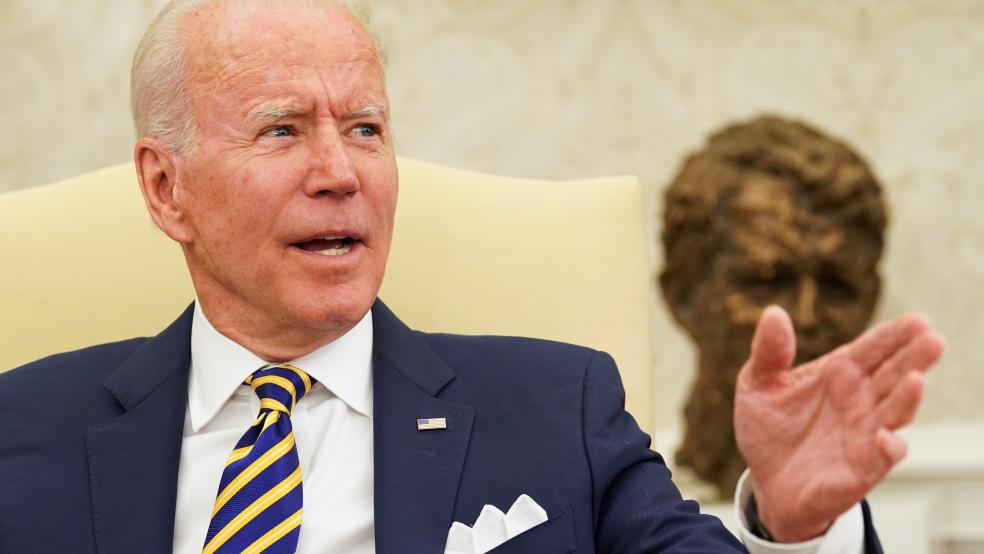President Joe Biden tackled his own infrastructure repair job over the weekend.
Biden had thrown the fate of his bipartisan infrastructure deal into doubt shortly after announcing it last Thursday by saying that the nearly $1 trillion package had to arrive on his desk “in tandem” with a larger bill focused on “human infrastructure” that Democrats plan to advance on a partisan basis.
“If this is the only thing that comes to me, I'm not signing it,” Biden said about the bipartisan deal. “I'm not just signing the bipartisan bill and forgetting about the rest.”
That comment appeared to be part of a Democratic leadership strategy to assuage the concerns of progressives, who want assurances that their priorities — climate change, health care, caregivers — won’t be cast aside. But it rankled a number Republicans, who warned that they might withdraw their support for the hard-fought bipartisan agreement.
In a lengthy statement issued Saturday, Biden backtracked in an effort to salvage the bipartisan deal, clarifying that his comments were not meant as a veto threat and he would support the bipartisan plan “without reservation or hesitation” — but still intended to pursue passage of the rest of his agenda as laid out in his American Families Plan. Biden said his comments “created the impression that I was issuing a veto threat on the very plan I had just agreed to, which was certainly not my intent. So to be clear: our bipartisan agreement does not preclude Republicans from attempting to defeat my Families Plan; likewise, they should have no objections to my devoted efforts to pass that Families Plan and other proposals in tandem. We will let the American people—and the Congress—decide.”
Republicans involved in the infrastructure negotiations said Sunday that Biden’s statement had eased their concerns. “I do trust the president,” Sen. Mitt Romney (UT) said on CNN’s “State of the Union.” “And he made very clear in the much larger statement that came out over the weekend, carefully crafted and thought through piece by piece, that, if the infrastructure bill reaches his desk, and it comes alone, he will sign it.”
Sen Rob Portman similarly told ABC’s “This Week” that he was glad Biden had “delinked” the two bills.
Pressure from McConnell: Senate Minority Leader Mitch McConnell, who hasn’t publicly backed the bipartisan deal, sounded less upbeat. On Monday, he welcomed Biden’s statement but called on the president to press House Speaker Nancy Pelosi (D-CA) and Senate Majority Leader Chuck Schumer (D-NY) to separate the two bills. Pelosi has said that the House will not take up the bipartisan deal until the Senate passes the Democratic package.
“The president has appropriately delinked a potential bipartisan infrastructure bill from the massive, unrelated tax-and-spend plans that Democrats want to pursue on a partisan basis,” McConnell said. “Now I am calling on President Biden to engage Leader Schumer and Speaker Pelosi and make sure they follow his lead.”
McConnell said that Biden’s statement “would be a hollow gesture” without a similar commitment from Pelosi and Schumer to the bipartisan deal. “The president cannot let congressional Democrats hold a bipartisan bill hostage over a separate and partisan process,” he said.
Pelosi won’t allow one bill without the other, analyst Chris Krueger of the Cowen Washington Research Group told clients in a note Monday, “so Biden can play the bipartisan hero as Pelosi plays the partisan heel.”
That setup at least raises the prospect that McConnell could still seek to scuttle the bipartisan deal and pressure moderates to withdraw their support if he opposes the Democrats’ approach.
Would Biden or wouldn’t he? At the same time, the White House has refused to explicitly say that Biden would sign the bipartisan bill if it landed on his desk alone. “The president looks forward to and expects to sign each piece of legislation into law and he’s going to work his heart out getting both of them across the finish line,” White House Press Secretary Jen Psaki said Monday in response to a question about whether Biden would sign just the bipartisan bill. Psaki said that it’s up to congressional leaders to determine how they’ll proceed on the two bills.
The abstruseness is clearly intentional. “The ambiguity helps the White House on two fronts,” The Washington Post’s Olivier Knox explains. “First, it keeps progressives on board by promising them Biden will fight for a Democrats-only infrastructure plan. … Second, it diminishes the impression GOP senators are going along with a process designed to get the broader package over the finish line, which might make an otherwise broadly popular spending item intolerable to the Republican base.”
What’s next: Negotiators and staffers will be drafting the actual legislation for the bipartisan deal while lawmakers are on their two week July 4 recess. Democrats, meanwhile, will also be debating the appropriate size of their reconciliation package, with Sen. Joe Manchin (D-WV) saying he could back as much as $2 trillion while Sen. Bernie Sanders (I-VT), chair of the Senate Budget Committee, has proposed as much as $6 trillion.
The bottom line: Biden appears to have salvaged the bipartisan deal, but the hubbub created by his unforced error last week shows just how fine a balance he’ll be trying to achieve to get either or both infrastructure packages passed.
“In that sense, it’s fellow Democrats that Biden now has to turn his attention to,” writes The Washington Post’s Peter W. Stevenson. “He needs to come up with the framework of a Democrats-only bill that placates liberals, and delivers on big campaign promises, while not being too loud about it, at the risk of upsetting or embarrassing the moderate Republicans he needs to keep onboard for the first bill to pass.
Budget
Biden Backpedals to Salvage Infrastructure Deal. McConnell Could Still Blow It Up.

Reuters/Kevin Lamarque




